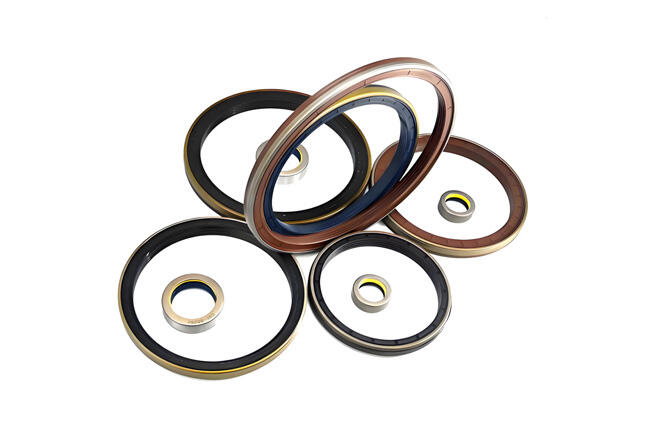When it comes to construction machinery, the excavator is a cornerstone of the industry. From digging foundations to loading trucks, this machine faces an unforgiving environment every single day—dust, mud, high pressure hydraulics, and continuous heavy-duty operation. Among the many components that keep an excavator running smoothly, oil seals play a subtle yet critical role. Though small in size, they are vital to protecting engines, gearboxes, and hydraulic systems from leakage and contamination.
But what exactly makes an excavator oil seal “qualified” for excavator use? For distributors, wholesalers, and maintenance providers, this is not a trivial question. Understanding the key performance requirements of excavator oil seals helps ensure reliable operation for end users while reducing downtime and service costs.
1. Material Performance for Demanding Environments
The starting point is always the material. Excavators operate under conditions that vary from scorching summer heat to sub-zero winters, all while being exposed to abrasive soil and hydraulic fluids. Different materials provide different advantages:
NBR (Nitrile Rubber): A standard choice for moderate temperatures and common hydraulic fluids.
FKM (Fluorocarbon Rubber): Better suited for high-temperature environments and chemically aggressive lubricants.
HNBR (Hydrogenated Nitrile): Offers superior wear resistance, making it ideal for continuous heavy-load applications in construction machinery.
For distributors, the key question is whether the selected material ensures consistent elasticity and sealing power across the wide temperature and pressure ranges excavators encounter daily.

2. Seal Structure and Pressure Resistance
Excavators depend heavily on hydraulic systems, where working pressures often reach 16–35 MPa. Oil seals used in these systems must maintain integrity under constant force. Qualified seals feature:
Double-lip design: One lip retains lubricant, the other blocks dirt, water, and dust.
Reinforced framework: Prevents extrusion under high pressure.
Spring-loaded contact: Ensures consistent lip pressure, even with minor shaft misalignment.
If the seal structure is not designed for such stress, common problems emerge—oil leakage, lip inversion, and premature wear. That is why B2B buyers often ask suppliers: “Has this seal undergone pressure resistance testing?”
3. Wear Resistance and Service Life
In construction projects, downtime equals lost revenue. An oil seal failure can immobilize an excavator, halting operations until maintenance is performed. To avoid this, excavator seals must be engineered for longevity:
Resistance to shaft roughness and micro-vibrations.
Stability against continuous rotational friction.
Endurance under temperature cycling and contaminant exposure.
4. Compatibility and Ease of Use
Excavator models from different manufacturers vary in shaft sizes and assembly conditions. To meet the needs of global equipment fleets, oil seals should:
Be available in a wide range of standard sizes covering popular excavator brands.
Allow easy installation, minimizing risks of damage during assembly.
Support customization for non-standard requirements, such as extreme heat, abrasive dust, or special hydraulic fluids.
For wholesalers and maintenance contractors, broad compatibility means fewer sourcing challenges and quicker response to end-user needs.
5. FAQ
Q: What is the biggest priority for bulk buyers?
A: Reliability of supply. Excavator downtime is often urgent, so wholesalers value suppliers who can provide seals directly from stock with fast shipment.
Q: What separates a dependable seal manufacturer from others?
A: The presence of in-house manufacturing facilities, technical know-how, and a comprehensive product range that covers not only standard but also non-standard demands.
Q: Is customization frequently required?
A: Yes. Excavators working in high-dust mines, extreme cold, or chemically aggressive conditions often require tailored sealing solutions. Suppliers who provide material selection, design, and testing support hold a strong competitive advantage.
6. NQKSF Enterprise Strengths
Beyond product features, business partners want confidence in their supplier’s capabilities. NQKSF has built this reputation through multiple strengths:
An independent manufacturing plant, ensuring consistent quality and reliable lead times.
Recognized as a leading enterprise in the sealing industry with complete product lines and full stock availability.
Sales network covering more than 80 countries worldwide, serving global brands.
Holder of a provincial technology innovation center, certified as a Specialized and Innovative Enterprise, a High-Tech Enterprise, and acknowledged as a leader in industrial clusters.
These credentials reassure customers that they are working with a stable, forward-looking partner capable of meeting global demand.
Excavator oil seals may be small components, but their function is central to the reliability of entire machines. For seals to be truly qualified, they must combine the right material selection, robust design, resistance to wear, and broad compatibility with the diverse range of excavator models in use worldwide.
 Hot News
Hot News